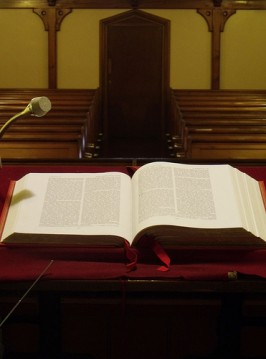 Several weeks ago, I went with some relatives to have dinner with the “matriarch” of one side of family. This was the first time I had seen her since I completed my graduate degree in December and, due to both the distance and age that separates us, it had also been many months since we had last talked. She asked an enormity of questions related to my degree and my future plans. And I spoke honestly about the fact that I plan to stand at a podium in a university lecture hall — not at a pulpit.
Several weeks ago, I went with some relatives to have dinner with the “matriarch” of one side of family. This was the first time I had seen her since I completed my graduate degree in December and, due to both the distance and age that separates us, it had also been many months since we had last talked. She asked an enormity of questions related to my degree and my future plans. And I spoke honestly about the fact that I plan to stand at a podium in a university lecture hall — not at a pulpit.
A while later at dinner, she slid me a check and said, “It would have been a whole lot less if you planned to become a preacher.”
While such a bold statement may shock some, I was unphased — my family has a history of saying things that would seem uncouth to an outsider looking in. And in all honesty, I understand her position. Her experiences with preachers and church have been related to rules and obligations (the don’ts) rather than the liberating words and actions of Jesus (the dos).
And it is unfortunate. I would like to think that, had I chosen to become a preacher, my role would be more valuable and perhaps even more honorable than as a professor (someday).
The challenge then, for preachers and parishioners alike (and anyone, for that matter), is to live the dos. Do love your neighbor as yourself. Do advocate for the marginalized. Do feed the hungry and clothe the naked. Do live in positive community. And do, as attributed to St. Francis of Assisi, preach the gospel at all times‒but only use words when necessary.







What’s your point?
Eric:
Really?? I believe Kyle made several points you could have engaged on rather than being ironically unclear with your own comment. For starters, one main point seems to be that many people’s “experiences with preachers and church have been related to rules and obligations (the don’ts) rather than the liberating words and actions of Jesus (the dos)”. For a possible application of this into community life, I take Kyle’s words to mean that faith-based people should be “preach[ing] the gospel at all times‒but only us[ing] words when necessary”. Why? Based off the first sentences I copied, God and a liberating Jesus are more powerful and should be used more than the ignorant, hurtful “don’ts” society perpetuates unthinkingly and misguidedly.
I’m not sure if you realize how you come across with your comments. Perhaps it is unintentional, but if you would take a few more minutes and craft a respectful, engaging question I’m sure Kyle would love to discuss issues with you.
Eric–the purpose of my writing is to applaud pastors who preach “dos” and to challenge pastors who preach “don’ts” to consider modifying their approaches. And, were the matriarch in my family to hear my preaching, I imagine that she may change her tune. But, because I am not planning to preach, the responsibility falls on those who are preachers. And I sincerely hope that she has interactions and experiences that will modify her view.
I can understand that idea but do you think the spiritual life doesn’t call us to any “do nots”?
Clearly, Eric, there are “don’ts.” But when the “dos” are followed, the “don’ts” are almost intrinsically followed, too. For example:
Love your neighbor as yourself. While this statement does not explicitly say “do not murder,” the the mandate of loving the neighbor inherently rules out murder.
While that example is extreme, it is a simple one. And, were we to only hear “do not murder, do not covet your neighbor’s house or wife, do not…,” would we sufficiently learn how to “do” life? One could argue that the “dos” are inherent in life, but encouragement from the pulpit seems more effective than mainly listing limits and boundaries.
I get what you are saying but you can’t get through the Old or New Testament without a deep appreciation for tons of good counsel on what not to do that will jack up your life or anothers. I am so grateful for the wisdom of what not to do as well as what to do that I have received in life. I don’t see it as a negative. I am grateful for all the road barriers on treacherous streets, I don’t see those as preventing me from an exciting ride but as keeping me safe by directing me away from death. Parenting little kids and parenting teens is also a wonderful testing ground for the idea of all this too.